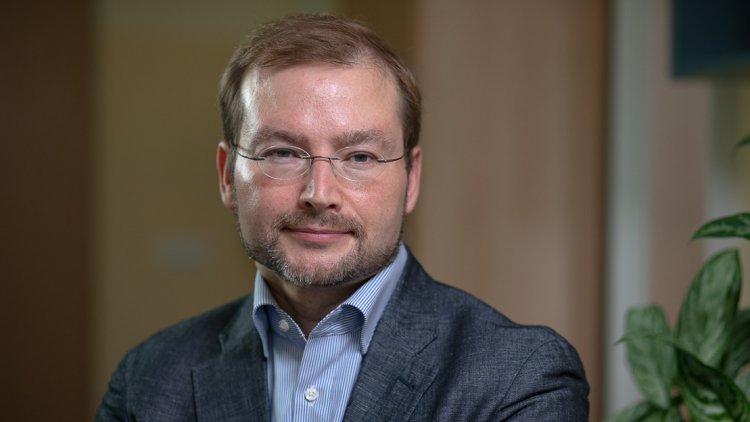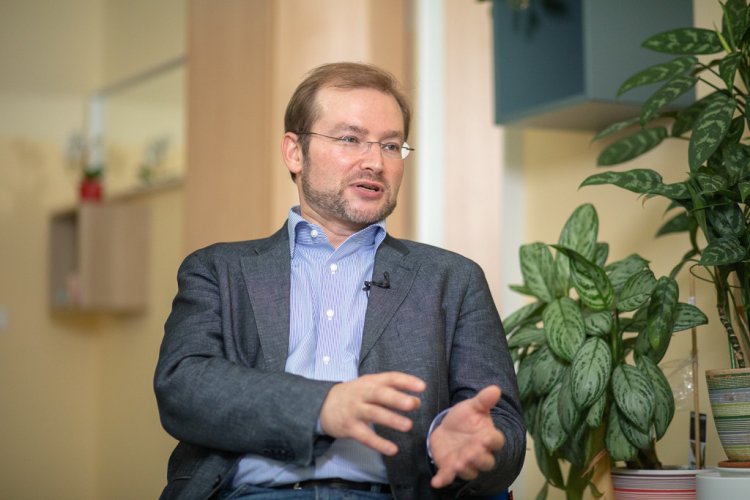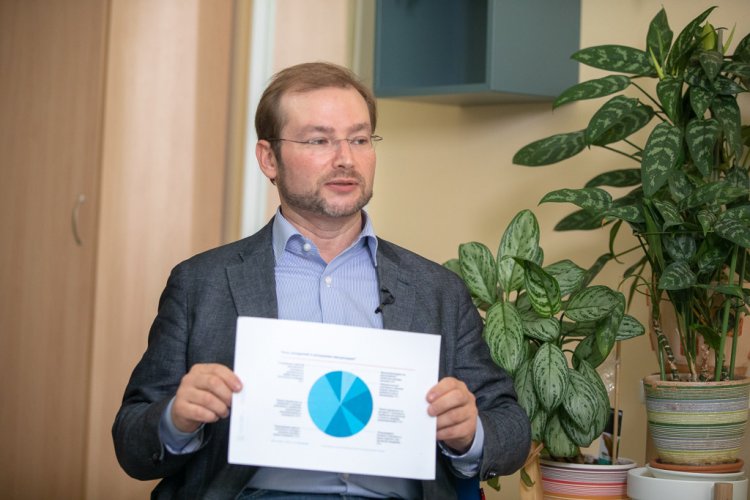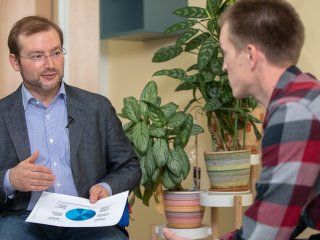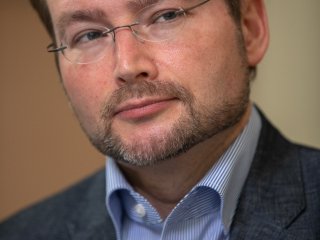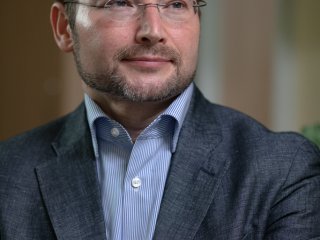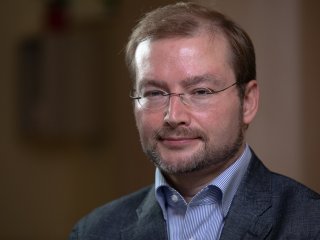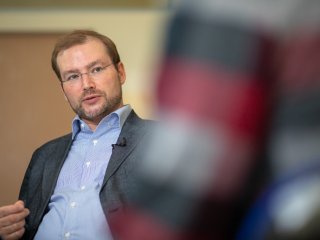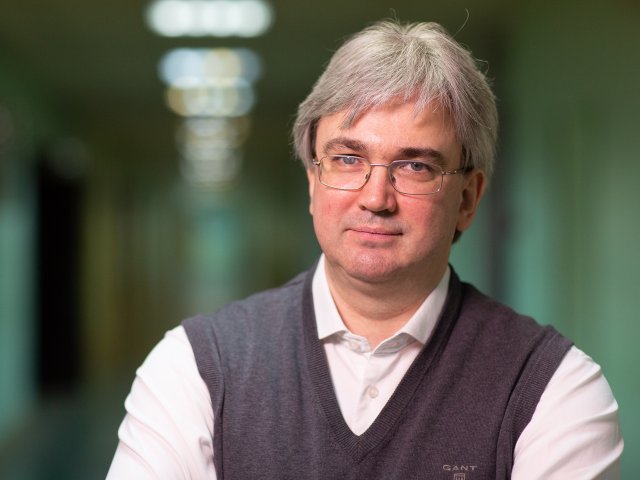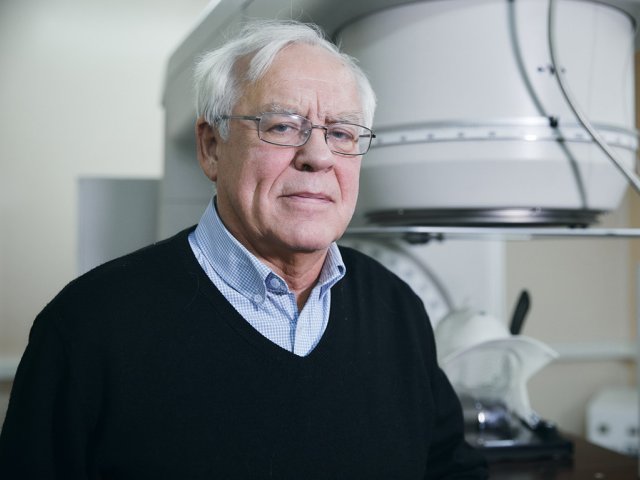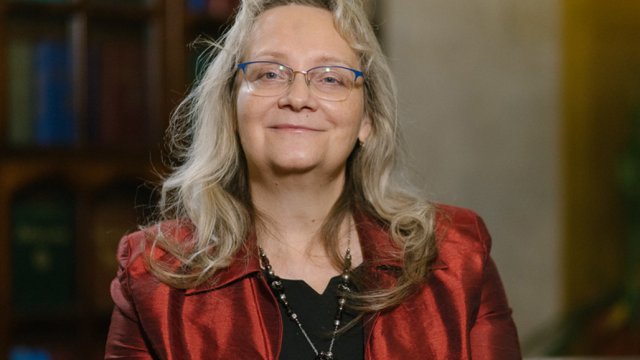How did a year and a half of the pandemic affect the psychological health of society? What protective mechanisms have Russians developed? Why was it not possible to complete the task set by autumn — to vaccinate 60% of the population? This is told by Professor of the Russian Academy of Sciences, Doctor of Psychology Timofey Aleksandrovich Nestik.
Timofey Aleksandrovich Nestik
Photo: Nikolay Mokhnachev / Scientific Russia
— The pandemic has been going on for more than a year and a half. In the spring and summer of 2020, the new disease was talked about on the streets, statistics were monitored, every third news was dedicated to the threat of COVID-19. At that time, 8–10 thousand daily new cases were recorded in Russia. In the fall of 2021, the daily increase in cases has outgrown the bar of 30 thousand, but the topic has become less frequent and much calmer. What is the reason for this?
— There are many reasons. Firstly, in a situation where we are worried about what is happening, but we believe that we cannot change anything, protective psychological mechanisms are triggered. They lead to the fact that we begin to underestimate the likelihood of a threat and the severity of the consequences. In addition, there is a decrease in confidence in social institutions and, first of all, in the state — this is typical not only for Russia but also for the majority of countries. We must also understand that we perceive new threats through already known ones and try to “tame” them: thus, there was hope that we would be protected by innate immunity, that the disease is no different from a common cold and should also be treated like a cold. We must also remember evolutionarily developed overoptimism. This is a situation when we see how one person got sick, another passed away, that is, “bullets are whistling very close,” but we think that they will bypass us.
Now the attitude towards the pandemic has changed. At first, most people assumed that the situation would improve by the end of the year; we were waiting for the new year, 2021, we wanted to leave the burden of the disease behind. But life has shown that the situation has become even more complicated: this is what we were warned about. Now a third of citizens believe that, most likely, the pandemic will last another two or three years. About 15% believe that it could take about five or even ten years — these are the results of our survey conducted this summer. Such figures indicate that we got used to it and developed various strategies that allowed us to adapt.
On the one hand, we observe an increase in the value of family, personal contacts, friends, emotional support, on the other — a decrease in trust in the world, people, and social institutions. As a rule, people’s experience of a difficult-to-control threat causes the reaction of several protective mechanisms that shift us to traditional values and make us expect more from the state. Russia has high rates of paternalism: hopes for guardianship from the state, accompanied by the removal of responsibility for what is happening in the country. This is noticeable in all age groups.
The situation increases polarization, we become tougher in our assessments. This is one of the paradoxes of human relations with the state during the pandemic, and not only in our country.
— Can we say that society is divided into optimists and pessimists?
— There are many more types. For example, the alarmists, who believe that it is necessary to take a tougher approach. In their opinion, people who do not care about their health and the health of others should be held responsible. 52% of the people we interviewed for the survey agree that vaccination should be mandatory for certain industries and categories of employees.
We can talk about pragmatists or skeptics. They rely on their own strength, more or less adequately assessing the severity of the consequences, primarily economic. They are counting not on the help of the state, but their own actions.
Fatalists can also be singled out, there are almost a quarter of them. Supporters of this position say: “We’ll contract it anyway” or “Neither I nor anyone else can influence what is happening.”
Of course, there are also social optimists: such an attitude to the situation is characterized by greater vitality and a higher level of psychological well-being. They trust social institutions more and are more willing to empathize with others.
Previous studies in Europe and the USA have shown that during pandemics, the level of democracy in a society decreases: there is a growing willingness to sacrifice some rights for the sake of safety. The world as a whole began to seem more hostile, the value of safety in our society has grown, as have authoritarian attitudes. Thus, according to the all-Russian apartment-by-apartment survey conducted by the Institute of Psychology of the Russian Academy of Sciences in April 2021 jointly with the Public Opinion Foundation and the ZIRCON Research Group (sample — 6 thousand), 49% of Russians are convinced that they live in a world that is like a jungle, where the strongest survives; 50% agree that our world is dangerous and unpredictable. The expectation has strengthened that there will be people at the helm who will be able to make tough decisions, but thereby give certain guarantees. On the other hand, the demands on the state are also increasing.
We are witnessing a blurring of the center, which previously could doubt, admit both points of view. We see that society is polarized even on issues that are not directly related to the pandemic. In Texas, for example, this is the anti-abortion law; for us, among other things, it is the belief in God and support for the death penalty.
This harshness in assessments and a simpler worldview, which we need when experiencing anxiety due to a difficult-to-control threat, also strengthens populism. It is characterized by the opposition of the people and the government. The intrigue is that different groups of society expect different things from the state: economic support is important for some; some believe that the state should stop interfering in our lives and remove restrictions; others, on the contrary, think that a tougher approach is needed. But in the end, it turns out that the authorities are wrong, they are underworking. Now such sentiments are especially noticeable.
Timofey Aleksandrovich Nestik
Photo: Nikolay Mokhnachev / Scientific Russia
— This June, the Russian Academy of Sciences made an appeal to Russians about the need to be vaccinated. Then they set the bar at 60–70% vaccinated by autumn. In the first half of September, about 27% were vaccinated with two doses. By the beginning of November, the number of vaccinated Russians had grown to only 33%. Why was the task not completed and how can people’s attitude to vaccination be characterized?
— It is important to consider that even before the pandemic in Russia, compared with other countries, a fairly large percentage of people (according to various studies, from 30% to 40%) took a cautious position regarding vaccination, and now this situation has worsened. A survey conducted by us together with OMI (Online Market Intelligence) of 2 thousand citizens on a quota sample in July showed that even among the 15% of respondents who planned to get vaccinated in the next two months, a third did not believe in the effectiveness of vaccines.
Contradictory statements of the authorities and experts played a key role here. When the scientific community had to demonstrate a consolidated position, this did not happen. The lack of consensus among experts is indicated by 72% of the citizens surveyed by us.
And 62% of those who do not plan to get vaccinated in the coming months say that they are not advised to get vaccinated by the doctors they know.
In addition, the reluctance to get vaccinated is associated with a low level of trust in social institutions and the media — during the pandemic, this is a global trend. We and our fellow sociologists observe an effect that can be called learned information helplessness. This is a situation when a person can no longer figure out what is true and what is false in the news about the coronavirus and concludes that no one can be trusted: neither official media nor the bloggers. But the main reason is that the experience of a difficult-to-control threat causes defensive psychological reactions. This manifests itself in the denial or underestimation of risk, as well as in the appeal to conspiracy theories. Compensating for the feeling of loss of control, we seem to say to ourselves: “I know what’s really going on.” Unfortunately, the susceptibility to such reactions does not depend on the level of education, and various conspiracy beliefs in one form or another are shared by about 80% of citizens. Many people say that a skeptical attitude to vaccination is due to a lack of education or just stupidity. Our research has shown that this is not the case: there are no significant differences in the level of education, the need for knowledge or interest in science between those who are ready to get vaccinated and those who refuse it. And there are very few radical anti-vaxxers — about 10–15%. Among those who do not plan to get vaccinated against coronavirus in the coming months, only 40% avoided vaccinations before the pandemic.
The majority simply postpone vaccination: 65% of respondents do not trust COVID-19 vaccines, which they think were developed too hastily and in violation of some rules.
We see that whipping up the fear of infection cannot reduce distrust of vaccines by itself. Efforts should be focused on building consensus among experts, primarily doctors.
Biases and conspiracy theories need to be countered by a unified position of the scientific community, confirmed by the results of research.
Only one in three Russians is afraid of contracting the coronavirus, but more than 60% worry for their loved ones. In the minds of the majority, the coronavirus infection is something obscure, with unclear consequences so far, and the figures are not convincing enough if we are talking about a threat that concerns us personally. We need examples of how an inoculation made in advance helped save a life.
— For example, 20 thousand is a lot, but out of 140 million — it’s not much?
— Yes, the tragedy of the situation is that the threat is invisible, we judge it mainly by the restrictive measures of the authorities. Fortunately, we don’t have piles of dead bodies on the streets. But in such a situation, we believe much more in vivid examples that we learn about through social networks or from conversations with friends. For example, the information that 95% of serious patients in hospitals are not vaccinated is unconvincing.
When statistics speak about such things, a person does not listen. But when they see a vivid example of how an entire family died, even though they were vaccinated, it is remembered and causes a reaction: unlikely events are overestimated, and highly probable ones – what statistics and science say – are either underestimated or ignored.
—How to build an information campaign about the need for vaccination in such conditions?
— First of all, such information campaigns should be targeted. Sanitary and epidemiological measures covered the whole country, the same messages with warnings and appeals were addressed to all of us. This impersonality of requirements enhances the effects of experiencing a difficult-to-control threat. The fear of losing oneself, one’s individuality increases, there is a protest and a desire to defend the right of choice.
Vaccination is a big problem in all countries, but I would like to emphasize once again that mass, depersonalizing solutions are less effective than targeted ones. After all, there are very different people among those who are now considering vaccination. When we decide whether we will get vaccinated, different criteria are important, and from this point of view, seven types of people can be distinguished depending on their expectations regarding vaccination.
The main claims that we hear are the allegedly insufficiently confirmed safety of vaccines and their effectiveness. Paradoxically, only 9% of people who decided to get vaccinated are really concerned about that. These are those who primarily pay attention to the confirmation of the safety of vaccines in independent sources.
For another 8%, it is fundamentally important whether coercion will be employed. Both our polls and polls of sociologists show that most people are ready to get vaccinated if they are forced to. For this 8%, it is important how significant the sanctions will be. I emphasize that this typology is based on relative differences. For example, the safety of the vaccine is important for everyone, but in comparison with it and other criteria, it is sanctions that come out in the first place for this type.
For another 9%, freedom of choice is essential. They attach particular importance to whether they could decide on their own, whether they will be able to choose which vaccine to get jabbed with.
In addition to those groups of people who have already been named, there are also those focused on authority. These are those for whom it is very important how respected people behave in society. They account for 19%.
We see those who are afraid of the disease, about 8% of them. The important questions for them are “How long will the pandemic last?”, “What is the probability that I will not get sick?”, “How high is the probability that I will not get infected at the vaccination center or polyclinic?”. When we address these people, we need to emphasize the growing risks associated with vulnerability to other diseases during a pandemic, explain how vaccination can protect against complications.
Finally, some people are willing to get vaccinated in the hope that they will be able to protect their loved ones and contribute to stopping the pandemic. There are about 15% of them.
And, of course, there are the award-oriented and those who seek approval from the majority. There are about 34% of such people. On the one hand, they are waiting for a “carrot” in the form of days off and other indulgences from the employer, and on the other hand, they want to make sure that if they are vaccinated, they will not look weird in the eyes of the others.
I would like to reiterate: we need to use different incentives. Some need to be told more about how the effectiveness and safety of vaccines are confirmed, others – about the qualifications of doctors at the vaccination center, and others – about the support of vaccination from the majority of representatives of their profession or reputable people.
It is important to understand that there are not many ardent anti-vaxxers and it is virtually useless to argue with them: several effects are triggered at once, one of which is the boomerang effect. It manifests itself in the fact that when we refute some myths, for example, that natural immunity is better than vaccine immunity, we eventually support this myth.
People who observe such a discussion, say, on social media, remember exactly what is being disputed, and not the counterarguments of the scientists.
The information campaign should be aimed at those who are hesitant: those who have not yet decided and are postponing vaccination. Most studies suggest that a reminder of risks should be associated with hope. For example, when talking about the danger of a new variant and the victims among those who have not been vaccinated, it is necessary to show examples of how vaccination saved the lives of the sick. The bet should be made not on intimidation, but on increasing people’s confidence that they can protect themselves and their loved ones.
Given the emergence of new variants, special attention should be paid to convincing fellow citizens of the need to comply with sanitary and epidemiological restrictions, even if there is a certificate of vaccination. Although 59% of those who have already been vaccinated claim that they observe the mask mandate, among those who have not been vaccinated, only 22% are firmly convinced that they will wear a mask after vaccination.
Photo: Nikolay Mokhnachev / Scientific Russia
— Could the possibility of a wide choice of vaccines correct the situation? For example, if there were Russian Sputnik V, EpiVacCorona and CoviVac, and foreign AstraZeneca and Pfizer at the vaccination center?
— I have heard a variety of points of view, even the idea that one of the vaccines should be made especially scarce so that people chase after it. This may attract some to vaccination centers but will alienate others. Such manipulations do not work for long and only increase distrust of the authorities.
It is necessary to expand the opportunity to choose: this has a psychotherapeutic value, supports in us what psychologists call self-efficacy – the understanding that we can influence what is happening. From this point of view, we should not limit the opportunities to be vaccinated with some foreign vaccines along with Russian ones. I am sure that few people would use the opportunity to be vaccinated with EU-certified vaccines, but the very fact that they exist would be important.
In this sense, it is completely counterproductive to try to belittle the effectiveness of vaccines developed abroad, whether American, European, or Chinese. This supports the effect of learned information helplessness: as a result of such marketing wars, we do not know who to believe. There is an impression that there is a struggle between pharmaceutical giants or interest groups, this is reflected in our research: 54% of respondents see coronavirus vaccination as a way of enrichment for pharmaceutical companies and medical professionals.
— There is the concept of an “information bubble:” a situation where certain requests on the Internet lead to the formation of a newsfeed that reflects one point of view. How does this situation affect the psychological state during a pandemic?
— We knew about this problem even before the pandemic, but it intensified to such an extent that we had to call it an infodemic. And this is due to the same polarization. We are much more sensitive to those messages that are consistent with our already established views. And the reminder of death strengthens the commitment to the values and beliefs of your social group, the division into “us” and “them.”
But in the case of social networks, the problem amplifies. Firstly, here our beliefs are reinforced by algorithms that look for sources of information similar to what we have already shown interest in. An information bubble is forming. Secondly, negative information spreads in social networks faster and with wider coverage than positive information. Social networks and messengers can enhance certain collective emotions, and they, in turn, affect how we perceive information.
In general, due to the COVID-19 pandemic, there is a 28% increase in depression and 26% in anxiety around the world. China and Australia are doing better, but there are also other countries, with an increase in anxiety and depressive disorders by more than 30% (for example, Russia, Ukraine, France, the US). According to our research conducted jointly with sociologists at the all-Russian surveys, every third Russian in the last two years has noted symptoms of clinical depression.
The level of depression is expressed higher than the level of clinical anxiety. I emphasize that we are not talking about anxiety or depressive disorder, but about symptoms – these are different things. For example, in the US, the opposite is true: the last two years they have had more severe symptoms of anxiety, and the symptoms of depression are lower. It seems to me that there is a difference in the assessment of our ability to influence the situation in the country.
Getting back to social networks and information bubbles: I would not overestimate the technical ways to solve the problem. When social networks begin to pre-moderate users’ messages on coronavirus or vaccination, this causes even greater distrust among people who already share conspiracy beliefs. Technical means are much less effective in the long run than investments in digital competence and the ability of users themselves to distinguish between lies and truth.
There are means whose effectiveness has been experimentally proven and does not depend on ideological beliefs. For example, a man is offered a game on a smartphone: first they “vaccinate” him with a lie, explain how this lie works, how fakes and deception strategies work, and then offer to practice on other messages where you need to separate the wheat from the chaff.
This is not the only way: we need to support fact-checking communities and put “unproven information” tags on messages, develop the ability of people to work together or independently adhere to some rules that reduce the number of fakes and allow to restrain polarization. The polarization is stronger the more we resemble each other in the community and the more we are affected by the issue. And the pandemic, unfortunately, is just that.
There is another extreme – the rejection of news about the pandemic, characteristic to one degree or another for a third of the citizens. In research, we see that this refusal can play a destructive role. On the one hand, this can reduce the severity of anxiety in cases when it comes to the symptoms of anxiety disorders. But on the other hand, those who actively seek information, try to approach its choice in a differentiated way, are psychologically more prosperous than people who are in information self-isolation. Those who are actively interested in what is happening and try to develop their own behavior strategy tend to look for more positive news on the Internet. And the selectivity of the search is associated with accepting the situation and relying on the emotional support of others.
Another of our studies shows that involvement in social networks by itself does not strengthen conspiracy beliefs. It all depends on the purpose for which we use them.
If a person has a high level of anxiety and distrust, social networks will increase their fears about what is happening and support their faith in conspiracy theories. And, on the contrary, if a person is looking for some kind of solution, information that can allow them to make a conscious choice, it strengthens constructive coping strategies – accepting the situation, seeking emotional support, and planning for the future. Therefore, I would warn against trying to abandon the Internet or disable someone’s access to it. Restrictions on information access under the pretext of concern for psychological well-being will lead to the exact opposite result.
— What forecasts do psychologists make about the pandemic in the long term? What can this situation result in in the field of psychological health of society?
— The Institute of Psychology of the Russian Academy of Sciences conducted several expert surveys on these topics among psychologists, not only academic but also practicing, with more than 15 years of experience. Most of the colleagues we interviewed predict a long-term effect. We can expect both depression and PTSD, which are typical for such situations. Studies show that even a few years after a traumatic pandemic experience, people may experience, for example, panic attacks or sleep disorders.
The echo of today’s events may overtake us much later. The probability of getting such a negative effect is higher for those who tried their best to avoid talking about the pandemic, hid their experiences from others, and did not empathize with others.
But other systemic effects are not related to whether we were sick ourselves or lost someone close to us. These are effects related to the macropsychological state of society.
Polarization, distrust of social institutions and learned information helplessness, a shift to conservative values and authoritarian attitudes make us vulnerable to populists – people who offer simple solutions, those who turn out to be a kind of political “entrepreneur” in conditions of high uncertainty.
In the long term, a serious problem may be the shifting of the shaky border between work and leisure, personal space and public – for those who worked remotely, this border was completely swept away. The pandemic has further sharpened the attention of managers to the psychological state of people. The transition of employees or students to remote work requires a change in personnel and educational strategies, making you look at an employee or student as an integral person who is much broader than their labor or educational roles. During crises, people need not only to provide a sense of security by the employer or the state but also to provide more tools for designing their development, to increase their confidence that they influence their present and future.
Another problem is the border between society and the state. In general, the structure of fears has not changed: most Russians are still concerned about social injustice, the growth of social inequality, environmental problems. But we see changes in the fears that are associated with the state. For example, all-Russian surveys conducted by the Institute of Psychology of the Russian Academy of Sciences together with the ZIRCON Research Group show that in comparison with 2019, in 2020, fears related to the possibility of state control over us with the help of digital technologies increased from 56% to 71%. Fears of restrictions on democratic freedoms increased from 50% to 63%. Our study in July 2021 showed that 66% of citizens are afraid of increased state control and new restrictive measures.
— Is it the formation of new and support of existing conspiracy theories?
— This suggests that society is in a very contradictory situation. On the one hand, we want more care and protection, on the other – we are more anxious when it comes to our personal data, about how exactly the state will control our behavior in such situations. This is not only a Russian problem: today the entire world is facing the need to develop new rules for interaction between the state and society in the face of global risks. Therefore, it is very important to turn the conversation from the medical agenda that held us back in 2020, from the economic agenda that became key in 2021 to the discussion of the social contract for the next 10-20 years — how our life will be built in conditions of global risks, because climate change, new pandemics, and new economic crises may be just around the corner.
— Does the pandemic give you a reason to think ahead?
— Yes. Moreover, we found a link between anxiety about the pandemic and the importance of having long-term goals, interest in the long-term future. To agree on a joint future, we need to develop mediation and facilitation skills that people need in order to maintain a dialogue.
In this case, the dialogue is not about what is happening here and now, but about how we will live in the coming decades.
During these two years, psychologists have learned a lot about human behavior in a crisis. For example, world psychology has advanced in understanding what personal characteristics affect compliance with sanitary and epidemiological restrictions and what makes us susceptible to an infodemic. But, most importantly, we were convinced: the more humane we are, the more willing we are to be compassionate and share our experiences, the more responsibly we behave during a pandemic, and the more inclined we are to think about the future.
— And have we become more humane?
— I want to believe that yes, although this can only be judged from the outside.
It seems to me that the most important thing today is to be aware of what we are saying to each other, what we are calling for. This should help us expand our social capital – the opportunity to find support, to see the world a little more complex, to notice semitones, to understand the point of view of another, to look into the future.
The interview was conducted with the support of the Ministry of Science and Higher Education of the Russian Federation and the Russian Academy of Sciences.
